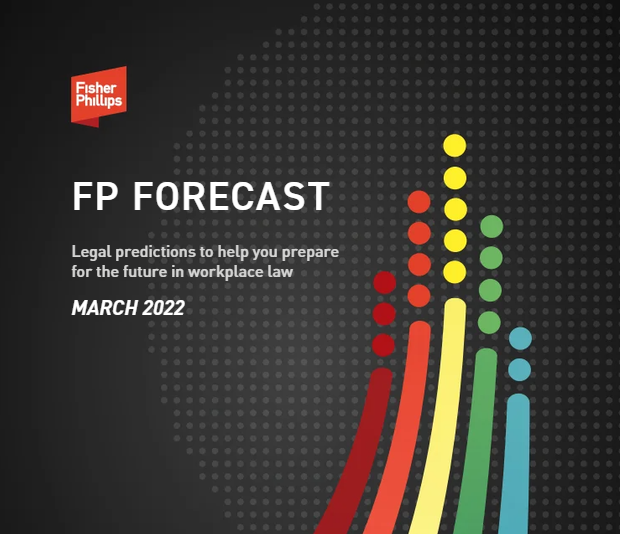FP Forecast: March 2022 Edition
Insights
3.15.22
Welcome to FP Forecast, a monthly outlook featuring Fisher Phillips thought leaders providing their insights into what employers can expect in 2022 and beyond. By following along each month, you’ll be in the best position to anticipate the expected changes and prepare your organization for what lies ahead. This month we look at the future of labor law, privacy and cyber, and employee defections and trade secrets – and take a special look at what financial services employers should prepare for.
Labor Relations
Steve Bernstein, Todd Lyon – Co-Chairs of FP’s Labor Relations Practice Group
- Virtual Meetings Will Be Here to Stay
COVID-19 is already transforming into endemic status (as predicted by our workplace safety lawyers two months ago), and the maintenance of virtual grievance meetings, collective bargaining, and arbitrations will be tested. Some parties will want to attend these meetings in-person while others will only be willing to meet virtually out of concerns for safety, expediency – and cost. At some point in 2022, a party will insist upon a position and ask the National Labor Relations Board (NLRB) to decide the matter. We expect the Board to conclude that the method of meeting (i.e., live and in-person vs. virtual) is not a mandatory subject of bargaining and therefore won’t require a party to meet live against their wishes.
- In-Person Organizing Efforts Will Explode
On the other hand, in-person union organizing efforts will resume with impunity in the coming months, as meetings in parking lots, employee homes, and on the shop floor will flourish. We expect to see a decision from the NLRB in 2022 expanding union access to employer property and making it far easier for organizers to come onto your grounds. You should consider fencing off your property boundaries and ensuring your no-solicitation policies are lawful and strictly enforced in advance of this shift.
- Labor Board to Push Hard
In some ways, it almost seems that the Biden administration has run out of time to pass any meaningful labor legislation given the filibuster-proof wall built by the GOP and the coming midterm elections. But with at least three years left in this administration’s term, you’ll see the focus shift to regulatory action. In 2022 (and beyond), the NLRB will continue with its pro-union agenda. We’ll soon see an expansion of the remedies for National Labor Relations Act violations, including the robust use of injunctions – particularly aiding newly organized groups. This expansion of remedies will cause a disincentive to settle disputes, leading to an increase of litigation at the agency level. This year will also see NLRB action that changes civility expectations by placing a greater level of scrutiny on workplace policies, reclassifies misconduct into protected concerted activity, and affords union organizers the unfettered use of employer email systems.
Privacy and Cyber
Risa Boerner (CIPP/US), Chair of FP’s Privacy and Cyber
- Patchwork of Consumer Privacy Laws Will Frustrate Employers
California got the ball rolling in 2018 when it adopted the groundbreaking CCPA, unparalleled in scope within the U.S. and creating broad new protections around personal information. Other states took note last year, as Virginia and Colorado both passed their own consumer privacy legislation. 2022 will be the year these laws begin to generate momentum coast-to-coast. More than 20 other states have introduced similar legislation, and we expect some of these bills to pass this year. Unfortunately, these proposed laws are not identical, and the prospects for a unifying federal statute are dim for the foreseeable future. You will need to not only monitor pending legislation but prepare to come into compliance with newly passed laws – and a flurry of amendments – that will make your life even more complicated by the end of 2022.
- Regulators Will Turn Up the Heat to Force Cybersecurity Diligence
By some reports, ransomware attacks spiked by 93% just last year. The FBI, CISA, and other federal agencies have warned U.S. businesses to prepare for a potential further uptick in attacks in 2022, especially in light of Russian threats. You will soon see regulators step up their efforts to ensure that businesses are securing their systems so that the supply chain is not further compromised. This will include investigations and penalties at both the federal and state level. As 2022 unfolds, you need to understand that your obligation to protect systems and data and the manner in which you do so are prescribed not only in industry-specific regulations and federal guidance but also in state statutes.
- Biometric Restrictions Will Spread Past Illinois
Employers’ use of biometric identifiers has increased in recent years – used for timekeeping, security, authentication of identity, and other purposes. For years, Illinois has stood alone as the one state with a sweeping biometric privacy statute that includes a private right of action. The dreaded BIPA has spawned numerous class action lawsuits and is a favorite tool of the plaintiffs’ bar to put employers to task who do not adhere to BIPA’s strict requirements. Already in 2022, multiple states have introduced BIPA-type bills, and we expect some to pass in the coming months and cause headaches for those that are not already in compliance with biometric best practices.
- Employee Monitoring Will Become More Necessary – And More Difficult
As remote work arrangements continue in 2022, employers will continue to look to develop methods of monitoring employee work and productivity while also securing data that employees are accessing while out of the office. Employers’ obligations to notify employees of monitoring activities already exist in some jurisdictions, and more requirements will come in 2022 as state and local lawmakers realize the extent of the issue. Just this past November, New York passed legislation requiring employers who engage in certain monitoring activities (including telephone, email, and internet usage) to notify employees in writing and post a notice for affected employees. Regardless of your location, you should take note and update prior practices to ensure compliance, as a generic handbook notice that may have been sufficient in the past may no longer pass muster by the end of the year.
Employee Defection and Trade Secrets
Bob Yonowitz, Co-Chair of FP’s Employee Defection and Trade Secrets Compliance Group, and Mike Greco, Member of FP’s Employee Defection and Trade Secrets Compliance Group
- The Array of Rigorous Non-Compete Laws Will Expand
In the past year alone, nearly two dozen states have considered new non-compete legislation. And that doesn’t count a handful of proposed federal bills or the dozens of already-existing state laws. Although the details vary, the proposed laws have a few common areas of focus: limiting (or prohibiting) the use of non-competes with low-wage workers; requiring employers to give prior notice of covenants to employees; imposing sizable statutory fines (on a per agreement basis) for utilizing unreasonable non-competes; allowing employees to recover attorneys’ fees if they prevail in litigation; and empowering states to bring enforcement actions against non-compliant employers. The increasing number of state laws will create a patchwork of competing requirements in 2022 that you cannot afford to ignore. A one-size fits all approach will no longer suffice, requiring you to put fresh eyes on and perhaps amend your restrictive covenants to ensure compliance – especially if you have employees in multiple states.
- Feds Will Turn Up the Heat on Non-Competes
Coupled with the unmistakable trend toward legislative reform, businesses should be ready for scrutiny from the federal government. Last year, President Biden issued an executive order urging the FTC to exercise its rulemaking authority to curtail the unfair use of non-compete clauses that unfairly limit worker mobility. Consistent with this directive, the FTC has already sponsored workshops, issued a strategic plan, and authorized compulsory process (such as Civil Investigative Demands) to investigate antitrust enforcement priorities, including harms against workers. This work in 2021 will lead to action in 2022, so you should assess the manner in which you protect your legitimate interests, such as trade secrets and business relationships, to make sure you stay out of the spotlight. Non-competes are but one tool in your arsenal. Developing a comprehensive trade secrets protection plan for 2022 is a must.
- Remote Worker Defections Will Require a Proactive Approach
Your trade secrets have never been more vulnerable given the combination of remote work and the fluidity of the modern workforce. Companies that established protections but don’t take proper steps to retrieve their data from departing employees will find their legal options blunted in 2022. It is essential for you to retrieve those devices immediately when employees leave your company. You should also consider setting company devices to block the use of USBs or other storage devices that are not owned by the company, while encrypting company USBs to only work with the company devices. Further, if you permit a remote worker to use their own devices to perform work, you must have a company policy or agreement that provides the employee’s consent and obligation to allow you to recover your data at time of separation. In 2022, you can’t afford to be reactive. Proactive approaches – technological, procedural, legal and policy wise – are essential.
Financial Services Industry
Rosemary Gousman and David Erb, Co-Chairs of FP’s Financial Services Industry Team
- Expect Bumpy Roads Ahead as Employees Return to Work
Many financial services employees will be returning to the workplace in 2022 after two years of working remotely. This reintegration will be accompanied by three massive issues you need to prepare for before you dust off all those work stations.
- Mental Health Concerns – The return of traditional challenges (such as frustrating commutes and complicated childcare arrangements) along with the readjustment to working in a structured environment will lead your employees to struggle with mental health issues. You could see increased requests for medical leave or remote work or workplace conflict. You should be prepared to address these issues by training supervisors and managers to recognize such issues and refer employees to appropriate resources.
- Abusive Behavior – Sensational scenes of poor behavior at airports, restaurants, and other public places have become discouragingly common. As workers return and more customers resume traditional banking activities, you should be prepared to promptly address instances of abusive behavior from co-workers or customers. Left unchecked, offensive conduct can result in employee turnover and hostile work environment claims. You should consider new training and team-building strategies aimed at reconditioning employees to successfully operate in collaborative, productive environments and be prepared to act quickly to correct offensive conduct.
- Accommodation Requests – Traditionally, requests for religious accommodations involved asking for time off for religious observations (e.g. no Saturday work in a branch) and relaxation of dress and grooming requirements. In 2021, financial services employers with a vaccine mandate almost certainly dealt with employees seeking a religious accommodation. In 2022, it won’t stop there. Now that workers believe they are educated about accommodation rights (often incorrectly), many more will seek relief from other workplace requirements – ranging from masking and COVID-19 testing requirements to attendance at DEI training. Addressing these issues will be particularly challenging since the law is rapidly evolving. Make sure to have resources available to properly evaluate these requests while protecting your own rights.
- The Metaverse Will Provide New Opportunities for the Financial Industry
With sales of virtual real estate garnering mainstream media attention, millions of young users playing Roblox each month, and an increasing number of companies exploring how augmented reality can help them in the virtual economy, the developing metaverse provides uncharted opportunity for entrepreneurial financial advisors to build their business in the increasingly adopted digital world – and turn younger generations into tomorrow’s investors. You won’t be meeting clients on your Oculus in 2022, but now is a great time to start considering the possibilities of this extensive new market. Spend this year educating yourself and getting comfortable with the metaverse. Securities regulators will naturally struggle with this business model, and there are sure to be many bumps in the regulatory road. But just like the long-awaited incorporation of interactive websites, social media, and Zoom into the fabric of FINRA, the metaverse – dotted with CFP, B-D, and advisory billboards – will eventually become part of investing life.
Conclusion
We will deliver monthly FP Forecast insights forecasting what to expect across the entire spectrum of workplace law over the entire course of 2022, so make sure that you are subscribed to Fisher Phillips’ Insights to get the most up-to-date information direct to your inbox. If you have further questions, contact your Fisher Phillips attorney or the authors of this Insight.
Related People
-
- Steven M. Bernstein
- Regional Managing Partner and Labor Relations Group Co-Chair
-
- David W. Erb
- Partner
-
- Rosemary S. Gousman
- Partner
-
- Michael R. Greco
- Regional Managing Partner
-
- Todd A. Lyon
- Partner
-
- Robert Yonowitz
- Partner
Service Focus
Industry Focus
Trending







